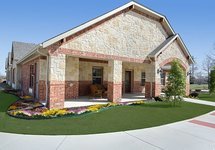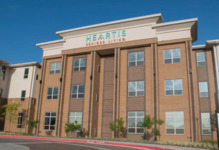Keller, Texas is a suburb in the sprawling Dallas-Fort Worth metroplex, located in between the two city centers. It’s a smaller town, pairing big-city conveniences with small-town roots and an emphasis on quality of life. Residents can take in a professional football or basketball game, visit the Dallas Zoo or shop in one of the area’s many malls. Keller is close to Grapevine Lake, a popular place for fishing and boating. The area is warm and sunny year-round, with long summers and mild winters. The crime rates in this city, both violent crime and property crime, are significantly lower than the national average, which many seniors may appreciate. Texas doesn’t levy a state income tax, which may make it easier for some residents to afford assisted living fees.
The Keller region offers seniors a variety of long-term care solutions, including its many assisted living facilities. These residential communities are for active seniors who need an extra hand with daily tasks such as dressing, bathing and meal preparation. In Keller, assisted living facilities charge $4,195 monthly for this type of care, which is higher than the typical Texas city but economical compared to the national norm.
With this guide, you can learn more about the most common ways seniors in Keller pay for assisted living and find free or low-cost resources in the community that can help.
Hundreds of thousands of American seniors utilize assisted living, a figure that is only growing. For these seniors, assisted living combines residential housing,assistance in daily activities, and some healthcare. These communities also strive to provide an atmosphere that is comfortable and engaging for their residents… Read More >
COVID-19 restrictions and rules for Assisted Living Facilities are typically set by the state – to see the rules in your state, you can read our guide to Assisted Living in Texas. Keep in mind that there may be other policies that communities put in place to protect their residents, so you should contact your local community for more information. Additionally, you can contact your local Area Agency on Aging to learn more – find contact information here.
In Keller, according to Genworth’s 2021 Cost of Care Survey, seniors pay $4,195 per month for assisted living.
Assisted living rates in Keller come in at $4,195 per month. This is about $200 more than the state average of $3,998. However, it’s about $300 lower than the national rate of $4,500.
Assisted living services in Keller are moderately priced at $4,195. For those seeking more economically priced care, El Paso’s monthly rates are about $450 lower at $3,750, and in Texarkana, rates come in at $2,400 less than in Keller at $2,770. In Killeen, rates are a little higher than in Keller at $4,217, and in Odessa, seniors pay $4,398, which is $200 more than in Keller. In Victoria, where assisted living rates are the highest in Texas, monthly fees are $1,400 higher than in Keller at $5,600.
Note: Data for Keller was unavailable, so data for the nearest city, Dallas, was used instead.

Since not everyone can afford to pay for assisted living out-of-pocket, it’s important to find alternative methods to help make assisted living more affordable. Some of these options include:
For more information about your options for making assisted living more affordable, visit our guide to Assisted Living in Texas.
| Contact | Description | |
| North Central Texas Area Agency on Aging | (800) 272-3921 | The AAA administers different programs to enhance the life of Keller seniors. These can include free educational seminars with topics related to seniors, such as financial planning and how to find long-term care accommodations, health screenings and different social events. Staff at the AAA can also help seniors apply for benefits they’re entitled to, such as health care and social security. |
| The Aging and Disability Resource Center of Tarrant County (ADRC) | (855) 937-2372 | This agency provides services for seniors aged 60 and older and their caregivers, including respite services. Caseworkers offer assistance with finding long-term housing and applying for Social Security and Medicaid. This agency sponsors a variety of programs for seniors, including financial planning and health awareness. There are also special programs for veterans. |
| Sixty & Better, Inc | (817) 413-4949 | Seniors receive nutritional information and assistance with meal planning and preparation, plus educational programs about health care topics that affect the elderly. Other social programs help seniors reduce loneliness and isolation. Transportation is provided for those who need it. |
| Alzheimer’s Association,North Central Texas Chapter | (800) 272-3900 | This organization provides resources for both those with dementia and their caretakers and family. Education programs about early detection and respite services are offered. Members receive care consultation and access to special groups for support and socialization for those in the early stages of the disease. |
| Dallas Volunteer Attorney Program | (214) 243-2236 | Local attorneys provide pro bono services for those who meet financial criteria. Help can include representation in civil cases, preparing legal documents, filing divorce or bankruptcy and investigating cases of elder abuse in long-term care facilities. |
| Dallas Area Regional Transit (DART) | (214) 979-1111 | The DART is a fixed bus route and light rail public transportation system that services the greater Dallas area. Seniors receive reduced fares, and handicapped shuttles and paratransit are available. |
| Wellness Center For Older Adults | (972) 953-7669 | The Wellness Center administers programs to address the health care and physical needs of the elderly. There is also a loan closet of durable medical equipment such as wheelchairs and canes, TTY equipment and toileting chairs, although items are dependant on donations. |
Assisted Living Facilities in the Keller area are required to follow a set of rules and regulations that are determined at the state level. For an overview of those rules and regulations, see the information below. For more specific information, talk with your local community or Area Agency on Aging.
























